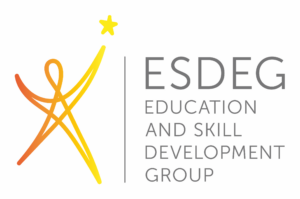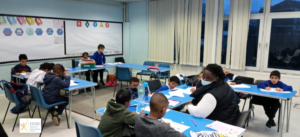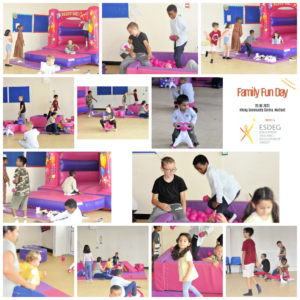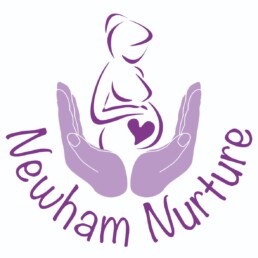4in10 Newsletter 8.3.23
Read the latest newsletter here.
To get this directly to your inbox every fortnight please do join us.
Children with special educational needs and disabled children

4in10 organised a coffee morning in February 2023 that was jointly hosted by staff and parents at Marjory Kinnon School in Hounslow. Rochelle McIntyre, the Family Support and Community Outreach Worker facilitated the discussion and had invited her colleague Jo Stacey, Assistant Head Teacher, Key Stage 2 and Staff Governor as well as a parent to provide first-hand experience.
This mother shared her experiences as a single-parent and the challenges of caring for a child with autism. Throughout the group discussion, a few key costs were mentioned that demonstrate the challenge of parenting and educating children with a learning disability. These include:
- Changing dietary needs and specific food items being essential to meet the sensory needs of the child, these foods are often more expensive or difficult to predict and buy reduced
- Clothing and textures becoming uncomfortable leading to new purchases frequently
- High costs to attend a sensory appropriate gym, averaging £17.50 per visit which swallows up a high proportion of the Disability Living Allowance (DLA) that her son is entitled to
- Taxis across London for appointments as the underground is too overstimulating
- This parent shared that her son often strips off his clothes at home meaning its particularly important to keep the house warm enough, thus adding to the cost of utilities.
The emotional side for parents was also highlighted. A parent in attendance explained that working part time and taking coursework all had to stop because it just became too overwhelming for her and exhausting to keep up. Even when she was able to access a personal assistant, there were still costs associated with the PA taking care of her son or taking him out and about that limited how much her son could do with her PA. Thus, it felt like there were always limitations and challenges as to how much help she could get because the costs keep adding up.
Another parent of a child with autism shared her own experiences and emphasised that practical help is important, but the challenge of supporting and adjusting to the sensory needs of a growing child with autism is always there.
At 4in10, we want to listen to these experiences and share them with those who make decisions that impact children and their parents. We want to highlight the financial and emotional challenges that parents face and the impossible situations that parents with low-incomes encounter when caring for a child with a special need or disability. If you have other thoughts or experiences that you’d like to share, please do get in touch so we can support growing more awareness and social action to advocate for better support of children with varying needs and financial situations.
4in10 Newsletter 9.2.23
Read the latest newsletter here.
To get this directly to your inbox every fortnight please do join us.
4in10 Newsletter 26.1.23
Read the latest newsletter here.
To get this directly to your inbox every fortnight please do join us.
4in10 Newsletter 12.1.23
Read the latest newsletter here.
To get this directly to your inbox every fortnight please do join us.
4in10 Newsletter 15.12.22
Read the latest newsletter here.
To get this directly to your inbox every fortnight please do join us.
Newham Nurture roundtable
4in10 Manager Katherine reflects on the Newham Nurture roundtable event she attended this week
Earlier this week I had the great pleasure of attending an event that showcased and celebrated the work of the Newham Nurture project. Newham Nurture is a community partnership with NCT, Alternatives Trust, The Magpie Project and Compost London. The programme supports women through pregnancy and up to two years after birth from low income, migrant and marginalised backgrounds experiencing financial hardship and disadvantage. It does this by providing drop-in pregnancy sessions, Baby & Me sessions for mums with babies from newborn up to 2 years, peer support and counselling.
A few reflections…
The project shone out as an example of what good partnership working and co-production ought to be, but all too often isn’t. The women from the project steering group, many of whom also deliver its work as volunteers and staff members, spoke eloquently and movingly about their own experiences of struggling to access the support they needed as pregnant and new mothers, about how the partner organisations were a lifeline for them and how passionate they are about making sure that help is now available to other women who so desperately need it. It was also clear from the discussion that there was a high level of mutual respect between the project partners and local statutory services, with a clear acknowledgement that unless services really listen to and act on what women are telling them then they will remain inaccessible to many.
There is a lot for others to learn from the experience of the project. While Newham’s challenges may be distinctive, there is no doubt that in many other areas of London there are families who would benefit enormously from the support of a project like Newham Nurture. The experience of having a baby can be a daunting and isolating experience for any woman, and if you add to that experience of loss and trauma, very low income, insecure housing, language barriers and discrimination, then this is magnified many times. The event concluded with a powerful audio recording of women who come to Newham Nurture talking about it and what it meant to them. The message that came over loud and clear was that they valued the project not only for the accessible, practical advice and support it gave them but also a place where they and their children could come, feel welcomed and enjoy the friendship of others who have trod similar paths ahead of them. Compost London are evaluating the work and I look forward to reading and sharing their findings with all the other organisations in the 4in10 network so that they can learn from the excellent work that Newham Nurture has planted, grown and is now blossoming in their community.
While the overwhelming feeling I had on leaving the event was one of hope; gained from witnessing the deep commitment that the women who lead this programme have to supporting one and another and working tirelessly to improve the lives of their young children, it was also tinged with anger. Anger that the choices of our politicians are wreaking such damage on these families’ lives and withholding the resources needed to ensure their children’s rights to food, health and education. With no end to the cost-of-living crisis in sight and further cuts to services on the cards, it is alarming to think that the situation for these families will get worse. Drawing on the hope and belief that change is possible, as the project so clearly demonstrates, we must redouble our effort to challenge these systemic injustices and demand better for children and families.
4in10 Newsletter 1.12.22
Read the latest newsletter here.
To get this directly to your inbox every fortnight please do join us.
4in10 Newsletter 17.11.22
Read the latest newsletter here.
To get this directly to your inbox every fortnight please do join us.
Spotlight on 4in10 Member Education and Skills Development Group

How are you helping to tackle child poverty in London?
At the Education and Skills Development Group (ESDEG) we strive to alleviate child poverty through education in the London borough of Ealing. We run several programmes that provide support to the children belonging to refugee and deprived communities so that they can perform at par with the rest of their school cohort and enjoy a dignified childhood.
Supplementary Schooling: ESDEG was started to help children from refugee and deprived backgrounds to perform better in school. Around 2005 a bunch of us noticed that the attainment rate for children from refugee families in the Ealing was pretty dismal. Somali children were struggling in school and consistently underachieving, so we started after-school homework clubs. Our tutors not only provide children help with academic subjects in particular English, Mathematics and Science, but also offer a safe space to share their experiences in and about school.
Summer Camps: Over summer and other holidays we team up with other local organisations to organise camps, family fun days, seaside trips, sports and other recreational activities because we realise that some of the parents from deprived backgrounds cannot afford to take their children on holidays and day outs.
Family and Schools Partnership: Our work with children and parents made us realise how much some parents from deprived backgrounds whose first language is not English struggle to communicate with the teachers and school staff. The challenge gets multiplied for parents who were not raised in the British education system. From this stemmed our next service, our Family Support Liaison Officers work as a communication bridge between schools and children and their parents. One of the major issues our liaison officers are working on are school exclusions, both formal and informal. We have also produced a research document based on case studies of exclusion cases among the Somali community in Ealing (report available in our website www.esdeg.org.uk)
Youth Mentoring Project: This project is designed to provide individual and group mentoring to inspire young people; help raise their self-esteem and aspirations; improve their attainment and behaviour; and reduce the likelihood of exclusions, crime and anti-social behaviour. We motivate them to study and succeed in life by looking up to successful role models. Moreover, we equip our mentees with the resilience, emotional intelligence and growth mindset to help them overcome their barriers. Our experienced mentors provide structured and engaging sessions to young people from minority backgrounds, offering guidance, support and encouragement aimed at developing the competence and character of their mentees. Young people often disclose concerns and problems that parents/carers and school staff are not aware of. Our mentors also detect and report any safeguarding concerns and help young people overcome issues of abuse, bullying, radicalisation, neglect etc.
Special Educational Needs and Disability (SEND) Project supports children in Ealing with special educational needs and disabilities (SEND). Our aim is to bridge the gap between families, schools and the Local Authority by working with both the parents and the children to ensure the child is receiving all the support they need for educational success. Our specialised staff focus on identifying the reasonable adjustments a child with SEND may need to reduce the disadvantages they face as well as providing extra encouragement in their learning and support with physical and personal care difficulties.
Tell us something you are excited about?
ESDEG’s integrative therapist has recently launched an initiative which encourages school children to express themselves through art. These exercises have been very effective with children who suffer from anxiety. Children not only express themselves more candidly through colours and pencils, they enjoy the process and are eager to come back for more. Seeing the success of this initiative, our counsellor is planning to expand this to other children as well.
Share with our members something positive about your organisation’s achievement or service?
Last year (2020-2021) we supported over 180 students through our supplementary schooling – helping to raise their academic achievement, self-esteem, and social skills. Over the last seventeen years since ESDEG started, we have seen the children who attended supplementary schools improve their performance in school, secure college places and go on to have successful careers.
What can other network members learn from you or find out more about through you?
ESDEG works with refugee and minority communities, the so-called hard-to-reach target groups. One of the main reasons for our successful outreach is that many of our staff are from minority backgrounds ourselves. Not only do we belong to the same community and speak the same languages, we understand the cultural and religious nuances which enhance communication and our clients feel confidence in our ability to provide them with high quality services.
What would most help you achieve your goals?
Like the other grassroots organisations we are also striving to operate with a limited pot of funding. Added to that is our struggle to secure office and training/meeting spaces for our day to day activities in the Ealing borough of London. The third challenge we face is in recruitment, training and retaining our staff. We feel that we could concentrate on our work a lot better if these administrative issues could be sorted.
Why did you join 4in10? What do you enjoy about being part of the 4in10 network?
To connect with like minded organisations who are working with disadvantaged groups. Also being part of the 4in10 network helps us be part of the collective voice of the sector.




